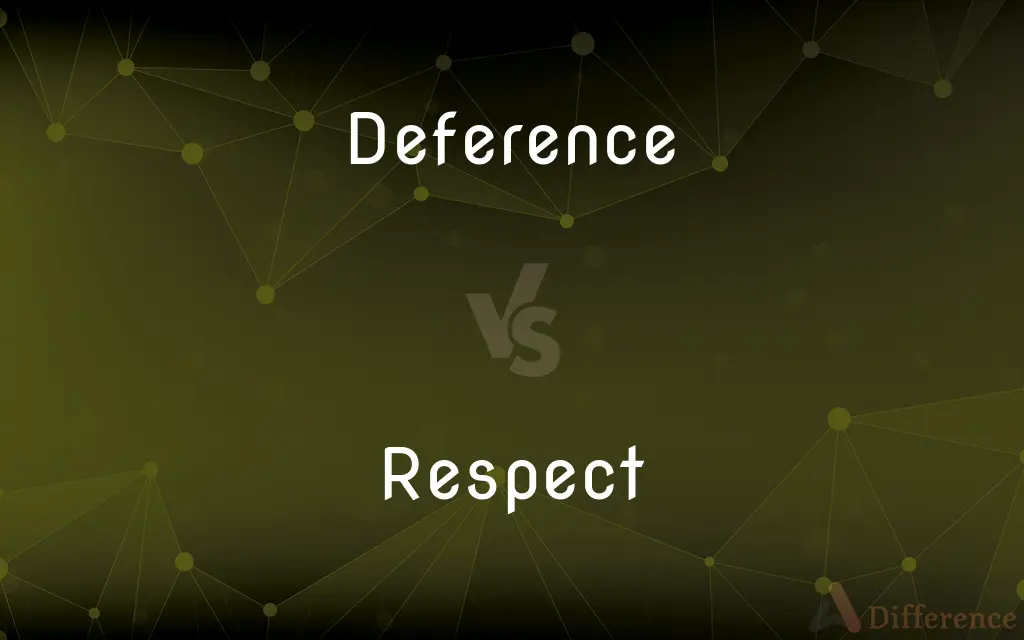Deference vs. Respect — What's the Difference?
By Urooj Arif & Fiza Rafique — Updated on May 1, 2024
Deference involves yielding to someone's opinion or desires due to their status or age, while respect is admiration for someone due to their qualities or achievements.

Difference Between Deference and Respect
Table of Contents
ADVERTISEMENT
Key Differences
Deference often implies a form of yielding or submission to another's judgment, preferences, or status, suggesting a hierarchy in social or professional interactions. Respect, on the other hand, is more about acknowledging and valuing someone's qualities, abilities, or achievements without necessarily implying a subordinate relationship.
While deference can be compulsory, based on societal or cultural norms, respect is usually voluntary and stems from genuine admiration. Deference might be seen in formal settings or institutions where protocols govern behavior, whereas respect can be evident in more casual, everyday interactions.
In many cultures, deference is expected from younger people towards their elders, reflecting an acknowledgment of seniority and wisdom. Respect, however, can be accorded to any individual regardless of age, based on their conduct and integrity.
Deference is often demonstrated through specific acts or rituals, such as bowing or using formal titles, indicating an acknowledgment of someone’s higher status. In contrast, respect can be shown through more subtle gestures like active listening or speaking positively about someone.
While deference might sometimes be given grudgingly as part of obligation, respect is more often associated with genuine esteem and a positive evaluation of a person, making it a more profound and meaningful interaction.
ADVERTISEMENT
Comparison Chart
Basis
Status, age, or position
Qualities, achievements, or character
Voluntariness
Often obligatory due to norms
Generally voluntary and heartfelt
Expression
Can include formal gestures (e.g., bowing)
Shown through actions like listening, praising
Relationship
Implies a hierarchy or authority
Can exist among equals
Cultural Context
Stronger in hierarchical or traditional societies
Universal across various cultures
Compare with Definitions
Deference
Submission to someone’s judgment due to their authority.
He showed deference to his mentor by following his advice without question.
Respect
Regard for the feelings, wishes, or rights of others.
She treated everyone with respect and kindness.
Deference
Acknowledgment of someone's higher status.
Deference to elders is expected in many cultures.
Respect
Positive evaluation of a person or institution.
The community holds the local school in high respect.
Deference
A deferential attitude.
His deference towards the director was noticeable during the meeting.
Respect
Admiration for someone due to their abilities or qualities.
He earned respect through his honest dealings.
Deference
Respectful or courteous regard.
In deference to her experience, the team accepted her strategy.
Respect
An act of showing consideration.
He showed respect by not interrupting while others spoke.
Deference
The act of yielding to someone's preferences.
Out of deference, the meeting was rescheduled to accommodate her.
Respect
Esteem due to a person's ethical standards.
Her integrity and fairness gained her widespread respect.
Deference
Deference (also called submission or passivity) is the condition of submitting to the espoused, legitimate influence of one's superior or superiors. Deference implies a yielding or submitting to the judgment of a recognized superior, out of respect or reverence.
Respect
Respect, also called esteem, is a positive feeling or action shown towards someone or something considered important or held in high esteem or regard. It conveys a sense of admiration for good or valuable qualities.
Deference
Polite submission and respect
He addressed her with the deference due to age
Respect
A feeling of appreciative, often deferential regard; esteem
I have great respect for your work.
Deference
Submission or courteous respect given to another, often in recognition of authority.
Respect
The state of being regarded with honor or esteem
A leader held in the greatest respect.
Deference
Great respect.
The children treated their elders with deference.
Respect
Consideration or appreciation
Can't you at least give me some respect?.
Deference
The willingness to carry out the wishes of others.
By tidying his room, he showed deference to his mother.
Respect
Due regard for something considered important or authoritative
Respect for the law.
Deference
A yielding of judgment or preference from respect to the wishes or opinion of another; submission in opinion; regard; respect; complaisance.
Deference to the authority of thoughtful and sagacious men.
Deference is the most complicate, the most indirect, and the most elegant of all compliments.
Respect
A particular aspect, feature, or detail
In many respects this is an important decision.
Deference
A courteous expression (by word or deed) of esteem or regard;
His deference to her wishes was very flattering
Be sure to give my respects to the dean
Respect
Usage Problem Relation; reference. See Usage Note at regard.
Deference
Courteous regard for people's feelings;
In deference to your wishes
Out of respect for his privacy
Respect
To feel or show deferential regard for; esteem or admire
All the other scholars respect her.
Deference
A disposition or tendency to yield to the will of others
Respect
To avoid interfering with or intruding upon
Please respect my privacy.
Respect
To avoid violating
I respected the speed limit throughout the trip.
Respect
To relate or refer to; concern
As respects the rights of land owners, this law says nothing.
Respect
(uncountable) an attitude of consideration or high regard
He is an intellectual giant, and I have great respect for him.
We do respect people for their dignity and worth.
Respect
(uncountable) good opinion, honor, or admiration
Respect
Polite greetings, often offered as condolences after a death.
The mourners paid their last respects to the deceased poet.
Respect
(countable) a particular aspect, feature or detail of something
This year's model is superior to last year's in several respects.
Respect
Good will; favor
Respect
To have respect for.
She is an intellectual giant, and I respect her greatly.
Respect
To have regard for something, to observe a custom, practice, rule or right.
I respect your right to hold that belief, although I think it is nonsense.
I respect your right to feel offended, even though most people, myself included, totally disagree and don’t find the comment offensive in the slightest.
Respect
To abide by an agreement.
They failed to respect the treaty they had signed, and invaded.
Respect
To take notice of; to regard as worthy of special consideration; to heed.
Respect
To relate to; to be concerned with.
Respect
(obsolete) To regard; to consider; to deem.
Respect
(obsolete) To look toward; to face.
Respect
(Jamaica) hello, hi
Respect
To take notice of; to regard with special attention; to regard as worthy of special consideration; hence, to care for; to heed.
Thou respectest not spilling Edward's blood.
In orchards and gardens, we do not so much respect beauty as variety of ground for fruits, trees, and herbs.
Respect
To consider worthy of esteem; to regard with honor.
Respect
To look toward; to front upon or toward.
Palladius adviseth the front of his house should so respect the uth.
Respect
To regard; to consider; to deem.
To whom my father gave this name of Gaspar,And as his own respected him to death.
Respect
To have regard to; to have reference to; to relate to; as, the treaty particularly respects our commerce.
Respect
The act of noticing with attention; the giving particular consideration to; hence, care; caution.
But he it well did ward with wise respect.
Respect
Esteem; regard; consideration; honor.
Seen without awe, and served without respect.
The same men treat the Lord's Day with as little respect.
Respect
An expression of respect of deference; regards; as, to send one's respects to another.
Respect
Reputation; repute.
Many of the best respect in Rome.
Respect
Particular; point regarded; point of view; as, in this respect; in any respect; in all respects.
Everything which is imperfect, as the world must be acknowledged in many respects.
In one respect I'll be thy assistant.
Respect
Relation; reference; regard.
They believed but one Supreme Deity, which, with respect to the various benefits men received from him, had several titles.
Respect
Consideration; motive; interest.
To the publik goodPrivate respects must yield.
Respect
(usually preceded by `in') a detail or point;
It differs in that respect
Respect
The condition of being honored (esteemed or respected or well regarded);
It is held in esteem
A man who has earned high regard
Respect
An attitude of admiration or esteem;
She lost all respect for him
Respect
A courteous expression (by word or deed) of esteem or regard;
His deference to her wishes was very flattering
Be sure to give my respects to the dean
Respect
Behavior intended to please your parents;
Their children were never very strong on obedience
He went to law school out of respect for his father's wishes
Respect
A feeling of friendship and esteem;
She mistook his manly regard for love
He inspires respect
Respect
Courteous regard for people's feelings;
In deference to your wishes
Out of respect for his privacy
Respect
Regard highly; think much of;
I respect his judgement
We prize his creativity
Respect
Show respect towards;
Honor your parents!
Common Curiosities
What is the main difference between deference and respect?
Deference involves yielding to someone due to their status, while respect is admiration based on qualities or achievements.
Can a younger person be shown deference by an older person?
It is less common, but possible if the younger person holds a higher position or special expertise.
How are deference and respect expressed in different cultures?
Deference often involves formal rituals in many cultures, while respect can be expressed more informally.
Can deference exist without respect?
Yes, deference can be practiced out of obligation even when respect is not genuinely felt.
Is respect always mutual?
While respect can be mutual, it is not necessarily so; one may respect another who does not reciprocate.
Why is deference important in professional settings?
Deference in professional settings helps maintain order and hierarchy, ensuring smooth operation and respect for authority and expertise.
Can respect be demanded?
While one can demand courteous behavior, true respect must be earned and cannot be compelled.
How can one show respect in a workplace?
Respect in a workplace can be shown by acknowledging colleagues' contributions, communicating openly, and treating everyone’s ideas with consideration.
Can deference lead to negative consequences?
Yes, if it stifles personal opinion or discourages constructive dissent, deference can have negative impacts on decision-making and personal growth.
Does showing deference affect one's self-esteem?
It can, depending on the context. Excessive deference might negatively impact self-esteem if it feels like submission rather than respect.
Is respect equal among all members of a society?
Ideally, everyone deserves respect; however, the level of respect shown can vary based on individual behavior, societal values, or cultural norms.
What role does deference play in traditional societies?
In traditional societies, deference reinforces social norms and hierarchies, often guiding interactions across generations and social strata.
How does one teach children the difference between deference and respect?
Teaching this difference involves explaining that deference is about recognizing roles or authority, while respect is about valuing a person's character or actions.
How does one balance deference and assertiveness?
Balancing these involves showing appropriate reverence for authority while confidently expressing one's thoughts or needs.
Is it possible to convert deference into respect?
Yes, through consistent demonstrations of competence, integrity, and fairness, obligatory deference can evolve into genuine respect.
Share Your Discovery

Previous Comparison
Kingdom vs. Dynasty
Next Comparison
Adjective vs. CharacteristicAuthor Spotlight
Written by
Urooj ArifUrooj is a skilled content writer at Ask Difference, known for her exceptional ability to simplify complex topics into engaging and informative content. With a passion for research and a flair for clear, concise writing, she consistently delivers articles that resonate with our diverse audience.
Co-written by
Fiza RafiqueFiza Rafique is a skilled content writer at AskDifference.com, where she meticulously refines and enhances written pieces. Drawing from her vast editorial expertise, Fiza ensures clarity, accuracy, and precision in every article. Passionate about language, she continually seeks to elevate the quality of content for readers worldwide.
















































